All screenings are held at the Auditorium at Northeastern Illinois University (Building E, 3701 W. Bryn Mawr Ave., Chicago, IL 60625).
General Admission: $5 • NEIU Students: $2
Programmed and Projected by Julian Antos, Becca Hall, and Kyle Westphal. Assistant: Hannah Greenberg
Wednesday, July 1 @ 7:00pm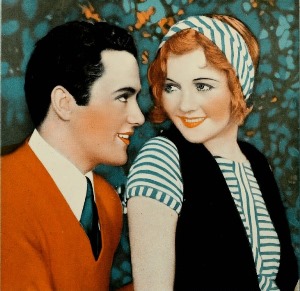
FOLLOW THRU
Directed by Laurence Schwab & Lloyd Corrigan • 1930
When Follow Thru opened in September 1930, nine months after the original Broadway play ended a very successful run of over 400 performances, it was just another peppy Technicolor musical in a season overabundant with them. But today, when its contemporaries survive in severely compromised versions or have been lost outright, the original camera negative of Follow Thru remains intact, yielding a restoration that beautifully reproduces the limited but ethereal palette of early Technicolor. It’s one cosmic fate for a proudly inconsequential evening’s entertainment. After second-generation golfer Nancy Carroll loses a country club match to catty Thelma Todd, she enlists the tutelage of that unthreatening hunk Charles ‘Buddy’ Rogers, the Svengali of the stroke. Upping the romance quotient, department store trust fund baby Jack Haley chases lady-caddy Zelma O’Neal—but does he want her love or just the return of the family heirloom he drunkenly gifted to her? (A bracingly wet Prohibition Era artifact, Follow Thru helpfully proposes olive oil as a pre-emptive folk remedy for hangovers.) With a score by De Sylva, Brown, & Henderson (Just Imagine) that manages to rhyme “my spirit is broken” with “I live in Hoboken,” Follow Thru is light on dance numbers, but the only one is a doozy: O’Neal performs “I Want to Be Bad,” complete with lines with devil-horned chorines. (KW) Film scholar David Pierce will introduce the screening and sign copies of his new book, The Dawn of Technicolor.
92 min • Paramount Pictures • Restored 35mm from UCLA Film & Television Archive
Wednesday, July 8 @ 7:00pm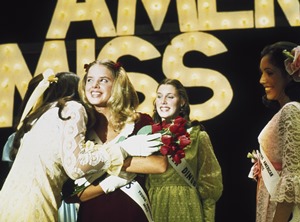
SMILE
Directed by Michael Ritchie • 1975
Raised on hamburgers and soda pop, she’s got a winning smile that’s hard to top. A credit to her family, the ideal teen, she’s America’s daughter, she’s a beauty queen. Shot on location in beautiful Santa Rosa, CA, using mostly local talent, Michael Ritchie’s funny-as-hell satire Smile follows thirty-three hopefuls through the tri-county area’s biggest and greatest cultural event: the Young American Miss Pageant. Wonderful and unbelievable pageant performances are balanced with behind the scenes subplots involving Big Bob Freelander (Bruce Dern), head judge of the pageant and Santa Rosa’s preeminent used car dealer. In 1986, the film was turned into a Broadway mega-production and stripped of its anti-commercial cynicism, which the stage play’s producers noted seemed “very out of touch with the 80s.” Smile remains a glistening time capsule of a USA still dripping with Watergate residue, and much like Sidney Lumet’s Network, cuts deep into the heart of dysfunctional American hypocrisy while simultaneously embracing it. (JA)
113 min • United Artists • 35mm from Park Circus
Wednesday, July 15 @ 7:00pm
GULLIVER’S TRAVELS
Directed by Dave Fleischer • 1939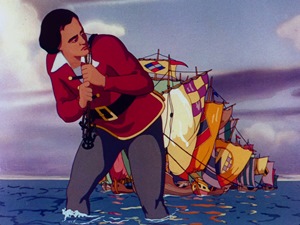
Poor Gulliver’s Travels. Trailing behind the success of Disney’s Snow White and the Seven Dwarfs by two years, the Fleischer Brothers’ first animated feature, funded and released by Paramount, did well at the box office but eventually fell into the public domain, realm of dupey 16mm TV prints and Walmart’s bargain DVD bin. (At least some of us remember VHS copies of the film so bad that even the finest VCR couldn’t track them properly.) No matter, we’ll be showing a beautiful 35mm IB Technicolor print in an effort to restore the film’s dignity after years of floundering. A good deal weirder and a little creakier than its Disney counterparts, Gulliver’s Travels used rotoscoping to animate the titular Gulliver and differentiate him from the adorable Lilliputians, who steal the show. Said the Los Angeles Times: “It is Gabby, the town crier, who carries the burden of fun on his tireless shoulders. He is, I should say, all Seven Dwarfs rolled into one …” (JA)
76 min • Fleischer Studios • 35mm Technicolor
Wednesday, July 22 @ 7:00pm
SUMMER WITH MONIKA
Directed by Ingmar Bergman • 1953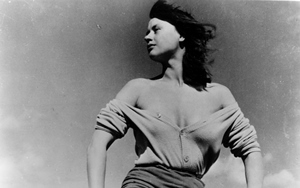
“I have never made a less complicated film than Summer with Monika,” boasted Ingmar Bergman. “We simply went off and shot it, taking great delight in our freedom.” Like the people who made Summer with Monika, the film’s teenage lovers (Harriet Andersson and Lars Ekborg) long only for a carefree summer, an escape from the stultifying world of adult falsehoods and stupid jobs back in Stockholm. They revel in the innate carnality of their embarrassingly perfect Nordic bodies, but can their luxuriant lifestyle outlast the summer—and Monika’s pregnancy? Celebrated by Jean-Luc Godard as “the first Baudelairean film” in the pages of Cahiers du cinéma in 1958, the lowlife appeal of Summer with Monika had already been thoroughly demonstrated by American exploitation maestro Kroger Babb, who recut the film to 62 minutes, dubbed it into English, appended a Les Baxter score, and released it as Monika, the Story of a Bad Girl. Alas, we’re showing the original version. In Swedish with English subtitles. (KW)
97 min • Svensk Filmindustri (SF) • 35mm from Janus Films
Wednesday, July 29 @ 7:00pm
MIDNIGHT
Directed by Mitchell Leisen • 1939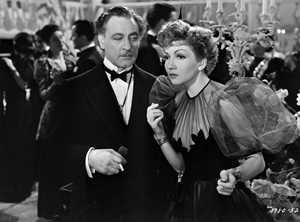
Bronx showgirl Eve Peabody (Claudette Colbert) arrives in Paris penniless, with only the gown on her back. She instantly enthralls earnest Hungarian cab driver Tibor Czerny (Don Ameche), but soon sets her sights higher. Using a Monte Carlo municipal pawn ticket as her calling card, Peabody gains entrée into Parisian high society, where she attracts the attention of soused aristocrat John Barrymore, who enlists her as an unwitting co-conspirator in his scheme to break up his wife (Mary Astor) and her lover (Francis Lederer). Things get even more complicated when Tibor turns up as the unstable “Baron Czerny”. This screwball romantic comedy is filled with quick-witted dialogue and terrific timing, typical of screenwriters Billy Wilder and Charles Brackett. Granted carte blanche by the studio, Leisen wound up crafting a fitting climax to Paramount’s decade of elegant, continental entertainment. A recent National Film Registry inductee, this is one Cinderella story where the magic lingers lost past midnight. (HG)
94 min • Paramount Pictures • 35mm from Universal
Wednesday, August 5 @ 7:00pm
IT’S TRAD, DAD!
Directed by Richard Lester • 1962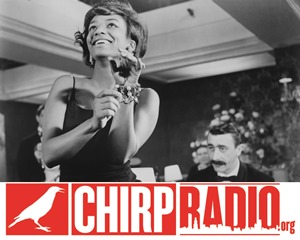
Real life chart-toppers Helen Shapiro and Craig Douglas star as two earnest teenagers who need to convince their adorably pudgy (but frightfully stern) mayor that the burgeoning jazz craze will not destroy their fair town. Also known as Ring-A-Ding Rhythm, A Hard Day’s Night director Richard Lester’s first feature was shot from a script only eighteen pages long: “I mean, there were no ideas in the script … just literally none. Anything that is there was mine. It had to be.” Infectious, inventive, and unpretentious, It’s Trad, Dad! set the bar for decades of performance films and music videos. Lester’s focus on musicianship brings a level of raw energy lacking in more straightforward music revue films, and the story of our teenage heroes, serialized between numbers, is surprisingly compelling and wacky. With performances by Gene Vincent, the Temperance Seven, Chubby Checker, Del Shannon, the Paris Sisters, and many, many more. (JA)
78 min • Amicus Productions • 35mm from Sony Pictures Repertory
Co-presented with CHIRP Radio
CHIRP is a volunteer-driven community radio station that focuses on music, arts, and culture, now celebrating its fifth anniversary in Chicago. Currently streaming live at CHIRPradio.org, the station will begin broadcasting at 107.1 FM later this year.
Wednesday, August 12 @ 7:00pm
HOUSEKEEPING
Directed by Bill Forsyth • 1987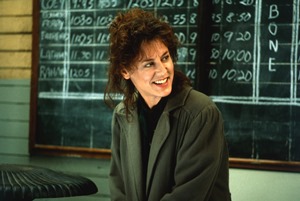
Marilynne Robinson’s 1980 debut novel Housekeeping receives a sterling and reverent adaptation from Scottish filmmaker Bill Forsyth. A thoroughly self-effacing artist, Forsyth is not shy about telling audiences to read the book instead, but it’s no either/or proposition. Set in a Pacific Northwest hamlet derived from Robinson’s childhood memories, Housekeeping explores the interconnected weight of memory, family, and conformity through a feminist prism. Following their mother’s suicide, orphaned sisters Ruthie (Sara Walker) and Lucille (Andrea Burchill) are shuffled from one impromptu guardian to another until winding up with their aunt Sylvie (a superlative Christine Lahti). A frizzly, live-wire soul with no stake in the status quo, Sylvie would rather recite train schedules than pretend to keep house. Spying a nascent rebel in Ruthie, Sylvie must spin a new fiction and charter a place in the world. Along with Hope and Glory and The Last Emperor, Housekeeping is an artifact of Columbia’s short-lived art film slate; following the ouster of production chief and Forsyth ally David Puttnam, Housekeeping was left to wander the winds, cluelessly marketed as a wacky comedy. It stands now as one of the very finest films of the 1980s—brittle, weightless, and mad. (KW) Introduced by Chicago-based filmmaker Stephen Cone, director of Black Box (2013) and The Wise Kids (2011)
116 min • Columbia Pictures • 35mm from Sony Pictures Repertory
Wednesday, August 26 @ 7:00pm
BEND OF THE RIVER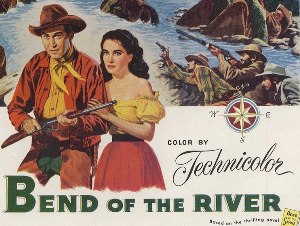
Directed by Anthony Mann • 1952
The second of eight collaborations between sullen tragedian Anthony Mann and sunny megastar James Stewart, Bend of the River makes for one tense and contradictory Western: visually expansive and emotionally boxed-in, Sunday school morality posed against confiscatory capitalism. Stewart stars as Glyn McClyntock, a reformed border raider who still has the rope marks across his neck to prove it. Like innumerable William S. Hart characters, McClyntock glimpses redemption just across the mountain pass, in the arms of a good woman (Julia Adams). Problem is, her father (Jay C. Flippen) is convinced that rotten apples can’t be saved, only discarded before they contaminate the whole civilized barrel. Arthur Kennedy co-stars as Stewart’s romantic rival, another reformed gunslinger who pushes the Apple Doctrine to its limit. The staggering location photography—fertile hills, snowy peaks, and, yes, a climactic bend of the river—mixes ably with a studio evocation of Portland as a vanished riverfront trading post. There’s plenty of action, but the real violence lies inside. (KW)
92 min • Universal-International • 35mm from Universal
Special thanks to Shayne Pepper, Michael Hines, Richard Helldobler, Kyle Burke, Cyndi Moran, Jordan Kardasz, Ernie Kimlin, and Tony Adams of Northeastern Illinois University; Randy Andrews of Swank Motion Pictures, David Antos & Chris Omiotek; Brian Belovarac of Janus Films; James Bond of Full Aperture Systems; Chris Chouinard of Park Circus; Neil Cooper; Amanda El-Khoury & Chaclyn Hunt; Justin Dennis of Kinora, Bill Francik; Bob Furmanek; Paul Ginsburg and Eric Chin of Universal; Katherine Greenleaf; Jim Healy of the Wisconsin Cinematheque; Steven Hill and Todd Wiener of UCLA Film & Television Archive; Louis Irmo of First Nonprofit Insurance; Dave Jennings and Michael Horne of Sony Pictures Repertory; Crystal Kui; Bruce Lawton; James Layton of the Museum of Modern Art; Steven Lucy; Bob Morrissey; David Pierce; Mike Quintero; Steve Stanchfield of Thunderbean Animation; Suzy Takacs of The Book Cellar; Kiyan Warner
